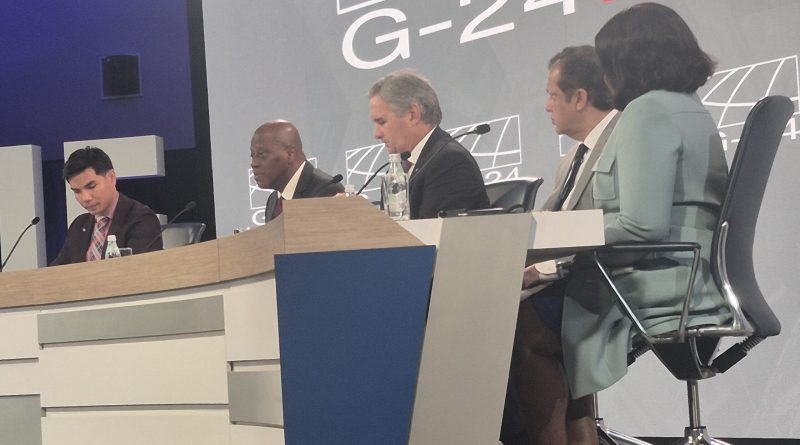Nigeria’s competitive currency spurs trade surplus, bolsters domestic production, says Cardoso
WASHINGTON D.C || Nigeria’s competitive currency has helped the country achieve a trade surplus and strengthened domestic production, Central Bank of Nigeria (CBN) Governor Olayemi Cardoso said on Tuesday.
The governor made the disclosure during a press briefing on the Intergovernmental Group of Twenty-Four on International Monetary Affairs and Development (G-24), a forum that coordinates the positions of developing countries on international monetary and development finance issues.
The G-24 session was addressed by Pablo Quirno, Secretary of Finance at the Ministry of Economy, Argentina. First Vice-Chair was Olawale Edun, Minister of Finance and Coordinating Minister of the Economy, Nigeria, who was represented by Governor Cardoso. Second Vice-Chair was Jameel Ahmad, Governor of the State Bank of Pakistan, and the Director of the G-24 Secretariat, Iyabo Masha, was also present.
Speaking on trade and tariffs, Cardoso said Nigeria had been relatively insulated from major external shocks.
“From Nigeria’s perspective, trade and tariff impacts have been less of a problem for us. We were fortunate because many necessary actions were done earlier, creating resilience and buffers against potential shocks. Oil is basically the only commodity so exposed, and the impact has been relatively modest,” Cardoso said. “We now have a more competitive currency, resulting in a positive balance of trade, with a trade surplus expected at around six percent of GDP. Essentially, this is part of a complete restructuring of the economy, where a competitive currency encourages domestic production and discourages imports.”
Read also: Nigeria takes over G-24 leadership as Cardoso, Uzoka-Anite lead talks at IMF/WorldBank meetings
On balancing economic growth with social equity, the governor emphasised the importance of sound domestic policies and multilateral coordination. “Countries operate within a global framework where multilateral institutions play a key role alongside governments. Balancing growth and social equity is critical. Sound domestic fiscal policies reduce government intervention in private markets, encourage investment, and facilitate growth. Coordination with multilateral development banks supports infrastructure, resource mobilization, and workforce development, strengthening the multilateral framework.”
He also highlighted the G-24’s role in fostering dialogue between developing economies and global institutions. “The G-24 is a body comprising countries with common interests. They have been relatively successful in facilitating dialogue. For example, this morning we had discussions with both the Managing Director of the IMF as well as the representative of the Managing Director of the World Bank, where there was an exchange of ideas that helps the leadership of the Bretton Woods institutions understand directly from the players what the issues are and where the pain points really lie.
From that perspective, it has been a very effective engagement. The communique that comes out is also very useful, covering issues from domestic resource mobilization to inflation and other commonalities among G-24 members. They learn from us, and we learn from them. There were points today about growth being behind, but not as behind as expected, and the correlation between sound macroeconomic policies, growth, and disinflation. These are critical issues for our economies.”
On the use of local currencies in trade settlements, Governor Cardoso acknowledged previous challenges but indicated ongoing efforts. “To be frank, we have had an experiment with that, and it didn’t work out very well for us. That’s not to say we are not interested; we are at an elementary stage of putting up a framework now that our currency is more competitive, to ensure it’s a win-win for everybody.”
In his remarks, Pablo Quirno noted that recent adverse shocks have left growth below pre-pandemic levels, with rising policy uncertainties creating substantial medium-term headwinds. Emerging market and developing economies have faced deteriorating terms of trade, reduced export volumes, and declining foreign currency earnings. Many of these countries have implemented domestic policies to mitigate uncertainty, but constrained policy space underscores the urgent need for collective solutions supported by multilateral institutions.

